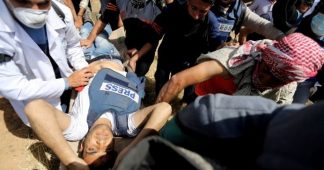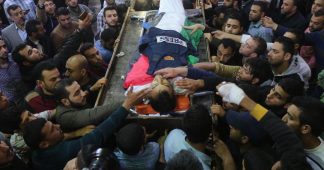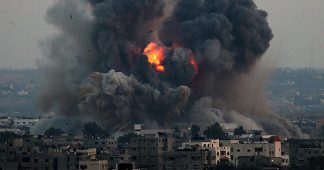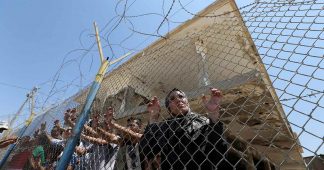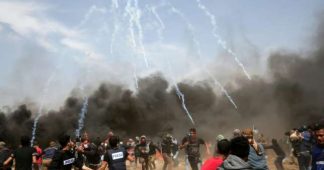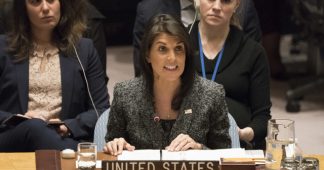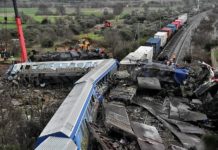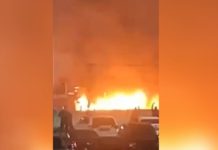Middle East Monitor interviewed fallen Palestinian journalist Yaser Murtaja before he was killed. His colleagues at Ain Media worked with MEMO’s Jehan Alfarra to complete the feature in tribute to him and all Palestinian journalists.
By Jehan Alfarra
April 19, 2018
What began as a hobby has taken Yaser Murtaja on a dangerous career path. An accountancy graduate turned video journalist, Yaser provided insight into an area marred by conflict and sealed away since 2007. Always carrying his camera and wearing a smile, the 30-year-old dedicated his life to telling the stories of fellow Palestinians living in Gaza.
MEMO spoke to Yaser about his journey and work as a journalist in the besieged Gaza Strip mere weeks before he was killed by Israeli snipers while covering mass Palestinian protests near Gaza’s eastern border.
Yaser’s first interaction with a camera was at 12 years old when his uncle came to visit. “He had a camera with him and I borrowed it and kept on shooting with it,” Yaser said. Having noticed Yaser’s passion for photography, his uncle gave him the camera as a gift.
“I started to photograph everything I came across; the house, the neighbourhood, nature,” he continued. “I simply could not put the camera down after that.”
One day whilst on his way to photograph a game of volleyball in his neighbourhood, Yaser heard a blast; it was an Israeli airstrike. He immediately changed route and went to film the bombing and the aftermath. “As I was filming, my camera fell and broke, but I salvaged the memory card and archived the material,” he said.
This incident was a taste of what would become Yaser’s career. He began teaching himself how to film and edit and take more professional photographs. “I used to film my friends, create montage outputs and gather them to watch the footage and have a laugh,” Yaser continued. “I called these gatherings ‘Watch and Remember’.”
As the siege on Gaza intensified, the territory witnessed a growing interest in social media as a window to interact and connect with the outside world. Consumed by the desire to portray the reality of life in Gaza, Yaser joined a number of associations and youth advocacy groups.
His photos and videos drew the interest of many international delegations and solidarity convoys who came to visit the Gaza Strip. “I started to produce short films about the reality of life in Gaza, shedding light on issues such as the electricity crisis, unemployment and border closures,” he added.
Ain media: Where it all began
Telling the stories of Gaza’s residents quickly became Yaser’s passion. Along with his friend Rushdi Sarraj, who also started out as an amatuer photographer, Yaser established a media company they would call Ain Media.
With two cameras and their $1,500 joint savings, Yaser and Rushdi purchased a laptop and started to produce images and short films from a small room which they rented in exchange for media coverage. They started to publish images on their Facebook page that reveal a face of the besieged territory often overlooked in the media; natural landscapes, landmarks and everyday life in Gaza.
Despite their lack of resources and technical background, Ain Media quickly grew into a reputable media production company with 15 staff members. “It was very difficult to acquire the gear and equipment we needed because of the restrictions on movement and imports,” Yaser said.
“We had to ask an international journalist that we worked with and befriended to bring us a drone camera,” he continued. “You know, some international journalists get special permits to enter Gaza and have more privileges.”
“We were one of the first production crews to own and operate one in Gaza,” he said proudly. “Sometimes we’d ask people to bring us equipment without testing or knowing if the performance will be as expected. We pay for it and hope for the best.”
“Everything was trial and error,” Yaser continued. “We all trained ourselves until we built a solid portfolio and started to work on big productions that caught the attention of international media outlets and many rights groups.”
Ain Media has produced work for Al Jazeera documentaries, BBC Arabic, VICE, Alaraby TV, UNICEF, UNRWA and Oxfam amongst others.
Witness to war
When Israel launched a war on Gaza in 2014, Yaser set out to document it without assignment or commission.
“I got engaged only a few days before the war kicked off,” Yaser told MEMO. “I wanted to be with my fiancée but I also knew I had to document what was happening.”
“I accompanied ambulance and civil services crews and filmed so many painful scenes,” he continued, describing it as the most horrific of the three Israeli military operations in Gaza over the past ten years.
Yaser became most notably known for Al Jazeera‘s documentary “Gaza: Surviving Shujayea“, in which he filmed a Palestinian child being dug out from under the rubble of her home in Al-Shuja’iyya neighbourhood. The child, Beesan, lost most of her family in the bombing, and Yaser, along with the medic who rescued her, struck up a close relationship with her to help her through the trauma.
Yaser said that cameras often invite bombing. “Israeli forces don’t shy away from targeting journalists, because they worry about the truth coming out” he stressed, “and we even produced a film called ‘Silencing Journalism’ about the journalists who were killed or injured by Israeli forces while doing their job.” Yaser said that sometimes paramedics would refuse to let them accompany them because they worry that the presence of a camera could be dangerous.
“Apart from the risk to my life, documenting war is an emotional and ethical minefield,” Yaser continued. “But I wanted to get the picture across and I needed the make the unheard heard.”
“I also wanted to document the bravery of the paramedics and firefighters,” he continued.
Undying hope
A husband and father of one, Yaser’s ultimate dream was to travel and see the world. “I’m 30 but I haven’t set foot outside of Gaza or ever been in an airport or on a plane,” he told MEMO. “We had offers to work in the UAE and the Gulf but because of the siege and border closures we couldn’t go.”
Border closures meant Yaser and his team missed out on several scholarship opportunities and festival participations. “I tried to leave recently but I was sent back from the Rafah border,” Yaser added.
“I haven’t given up though,” he continued. “As Darwish said: ‘We Palestinians suffer from an incurable disease called hope’.”
Before Yaser could achieve his dream of flying and seeing the world, he was shot by an Israeli sniper on 6 April while covering the Palestinian “‘Great March of Return” calling for the Right of Return and an end to the siege.
“We took Yaser to hospital, where he underwent two surgeries,” Rushdi Sarraj, co-founder of Ain Media and Yaser’s closest friend, told MEMO. “Twelve hours later, Yaser left us.”
Describing Yaser as “a very professional journalist and a very ambitious human being who had initiative and passion for his work,” Rushdi said the news came as a shock to him and his colleagues. “We were all struck by an unspeakable amount of grief.”
“We lost a friend, a colleague and a brother,” Yaser’s colleagues and film director Ibrahim Al-Otla said.
MEMO’s feature about Yaser and his work was being finalised when Yaser was shot. His colleagues at Ain Media worked with MEMO to complete the feature in tribute to him and all Palestinian journalists who risk their lives to document life under occupation in Gaza and the rest of the occupied Palestinian territories.
“We were supposed to be filming the last scene of the video feature on Saturday, the day Yaser died,” Al-Otla said. “That scene turned out to be the scene of his death.”
Rushdi says that he and his team are determined to continue Yaser’s work. “He always strived to document everything in the hope that one day Palestinians in Gaza would get their full rights back and live a dignified life.”
“We will pick up the torch and carry his message,” he asserted.
Armed only with his camera, Yaser became an embodiment of a population of Palestinians driven by hopes and dreams of freedom and of a better life.
